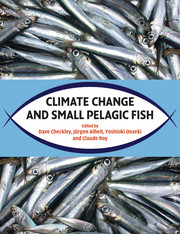Book contents
- Frontmatter
- Contents
- Acknowledgments
- List of abbreviations
- List of contributors
- Foreword by Jorge Csirke, Michael Glantz, and James Hurrell
- Preface
- 1 History of international co-operation in research
- 2 A short scientific history of the fisheries
- 3 Habitats
- 4 Variability from scales in marine sediments and other historical records
- 5 Decadal-scale variability in populations
- 6 Biophysical models
- 7 Trophic dynamics
- 8 Impacts of fishing and climate change explored using trophic models
- 9 Current trends in the assessment and management of stocks
- 10 Global production and economics
- 11 Human dimensions of the fisheries under global change
- 12 Mechanisms of low-frequency fluctuations in sardine and anchovy populations
- 13 Research challenges in the twenty-first century
- 14 Conjectures on future climate effects on marine ecosystems dominated by small pelagic fish
- 15 Synthesis and perspective
- Index
13 - Research challenges in the twenty-first century
Published online by Cambridge University Press: 08 January 2010
- Frontmatter
- Contents
- Acknowledgments
- List of abbreviations
- List of contributors
- Foreword by Jorge Csirke, Michael Glantz, and James Hurrell
- Preface
- 1 History of international co-operation in research
- 2 A short scientific history of the fisheries
- 3 Habitats
- 4 Variability from scales in marine sediments and other historical records
- 5 Decadal-scale variability in populations
- 6 Biophysical models
- 7 Trophic dynamics
- 8 Impacts of fishing and climate change explored using trophic models
- 9 Current trends in the assessment and management of stocks
- 10 Global production and economics
- 11 Human dimensions of the fisheries under global change
- 12 Mechanisms of low-frequency fluctuations in sardine and anchovy populations
- 13 Research challenges in the twenty-first century
- 14 Conjectures on future climate effects on marine ecosystems dominated by small pelagic fish
- 15 Synthesis and perspective
- Index
Summary
Summary
A selection of scientific issues is presented as being likely keys to (1) effectively managing the future of small pelagic fisheries under the combined stresses of climate change and ever-increasing demand for fishery products, and (2) understanding the role that small pelagic fishes may play in maintaining the health, integrity and resilience of the large marine ecosystems in which they function. The concept of a wasp-waist ecosystem is presented, according to which a highly variable small pelagic fish component, largely responding to its own internal dynamics, may significantly drive the operation of its entire ecosystem. On the basis of this conceptual framework, a number of vital unresolved issues are briefly elaborated. Several types of nonlinear feedback mechanisms, capable of leading to abrupt instabilities and durable regime shifts, are presented together with the concept of breakout thresholds that may trigger a shift from a favorable phase of feedback operation that supports resilience to an adverse phase leading to abrupt system changes. Proposed mechanisms underlying distributional dynamics are appraised; a suggested connotation is that changes in distributional aspects of key populations may be timely harbingers of unwelcome regime shifts. Several alternative interpretations of apparent density dependent growth are offered, each presenting rather different implications with respect to sustainability. The mechanisms behind apparent niche replacements and species alternations are pondered. It is suggested that SPACC-type research be extended to similar small pelagic species and issues in other more tropical and/or more oceanic ecosystems.
- Type
- Chapter
- Information
- Climate Change and Small Pelagic Fish , pp. 300 - 311Publisher: Cambridge University PressPrint publication year: 2009
- 1
- Cited by



